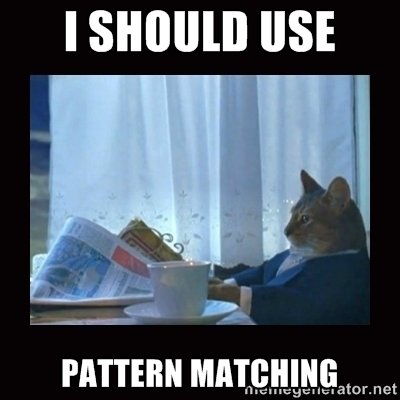What the if?
Máté Marjai - Erlang Ireland 2016 January
@erlangireand
Helping to build software ideas, products, teams and companies.

@theproductworks
Forget all you know about conditionals

# greetings in Ruby
def greetings(name, language)
greeting = if language == "EN"
"Hi #{name}!"
elsif language == "FR"
"Salut #{name}!"
elsif language == "HU"
"Szia #{name}!"
else
"Hello #{name}!"
end
puts greeting
endGreetings human
% greetings in Erlang with Ifs
greetings(Name, Locale) ->
Greeting = if
Locale =:= "EN" -> "Hi " ++ Name ++ "!";
true ->
if
Locale =:= "FR" -> "Salut " ++ Name ++ "!";
true ->
if
Locale =:= "HU" -> "Szia " ++ Name ++ "!";
true -> "Hello " ++ Name ++"!"
end
end
end,
io:format(Greeting, []).
Literal translation
% greetings in Erlang with Ifs
greetings(Name, Locale) ->
Greeting = if
Locale =:= "EN" -> "Hi " ++ Name ++ "!";
Locale =:= "FR" -> "Salut " ++ Name ++ "!";
Locale =:= "HU" -> "Szia " ++ Name ++ "!";
true -> "Hello " ++ Name ++"!"
end,
io:format(Greeting, []).
Literal translation
% greetings in Erlang with case statement
greetings(Name, Locale) ->
Greeting = case Locale of
"EN" -> "Hi " ++ Name ++ "!";
"FR" -> "Salut " ++ Name ++ "!";
"HU" -> "Szia " ++ Name ++ "!";
_ -> "Hello " ++ Name ++ "!"
end,
io:format(Greeting, []).
In case ... of
Guards

% greetings in Erlang with an internal function using guards
greetings(Name, Locale) ->
Greeting = greetings_1(Name, Locale),
io:format(Greeting, []).
greetings_1(Name, Locale) when Locale =:= "EN" ->
"Hi " ++ Name ++ "!";
greetings_1(Name, Locale) when Locale =:= "FR" ->
"Salut " ++ Name ++ "!";
greetings_1(Name, Locale) when Locale =:= "HU" ->
"Szia " ++ Name ++ "!";
greetings_1(Name, _) ->
"Hello " ++ Name ++ "!".
Using guards

% greetings in Erlang with pattern matching
greetings(Name, Locale) ->
Greeting = greetings_1(Name, Locale),
io:format(Greeting, []).
greetings_1(Name, "EN") -> "Hi " ++ Name ++ "!";
greetings_1(Name, "FR") -> "Salut " ++ Name ++ "!";
greetings_1(Name, "HU") -> "Szia " ++ Name ++ "!";
greetings_1(Name, _) -> "Hello " ++ Name ++ "!".
Matching on Locale
% greetings in Erlang with pattern matching
greetings(Name, Locale) ->
GreetingFmt = greetings_format(Locale),
io:format(GreetingFmt, [Name]).
greetings_format("EN") -> "Hi ~s !";
greetings_format("FR") -> "Salut ~s !";
greetings_format("HU") -> "Szia ~s !";
greetings_format(_) -> "Hello ~s !".
Matching on Locale
% greetings in Erlang with pattern matching
% local format is "FR" or "FR-CA"
greetings(Name, Locale) ->
GreetingFmt = greetings_format(Locale),
io:format(GreetingFmt, [Name]).
greetings_format("EN") -> "Hi ~s !";
% Combine some the different approaches
greetings_format("EN-" ++ Country) ->
case Country of
"IE" -> "Heya ~s!";
"GB" -> "Jolly good day to you ~s!";
_ -> greetings_format("EN")
end;
% Use the guards as the second check
greetings_format("DE-" ++ Country) when Country =:= "DE" ->
"Hallo, ~s!";
greetings_format("DE-" ++ Country) when Country =:= "AT" ->
"Grüss gott ~s!";
greetings_format("DE" ++ _) ->
"Hallo, ~s!";
% Or create a granular matching on the param
greetings_format("FR-CA") -> "Bonjour ~s !";
greetings_format("FR" ++ _) -> "Salut ~s !";
greetings_format("HU") -> "Szia ~s !";
greetings_format(_) -> "Hello ~s !".Combine the options
What the if?
By Máté Marjai
What the if?
Erlang Ireland about using conditionals in Erlang
- 699


